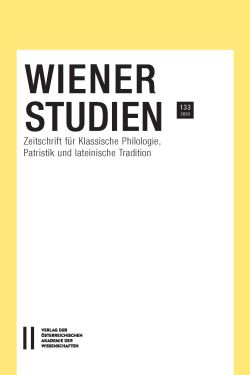|
 |
Andreas H e i l , Jörgensens Gesetz in der homerischen Nekyia
Jaroslav D a n e š , Epithets and Metaphors of War in Ancient
Greek Poetry until the End of the Fifth Century
Alessio R u t a , Ancient Mythographers in the Paroemiographical
Tradition: Some Remarks on Herodorus and Hellanicus
Luigi B e l l o n i , Ekphrasis e mythos a confronto nel Vecchio e
nel Nuovo Posidippo
Claudio D e S t e f a n i , Das Fragmentum Bucolicum Vindobonense
(Pap. Graec. Vindob. 29801)
Andrew C a i n , Antony’s Onocentaur: The Symbolism of a
Mythological Curiosity (Athanasius, Vita Antonii 53,1–3)
Emanuel Z i n g g , Zum Verhältnis zwischen dem Anonymus
Treu (Par. suppl. gr. 607A), Iohannes Lydos, De mensibus
und Porphyrios, De simulacris. Nebst Neuedition und Übersetzung
der fünfzehn im Anonymus Treu enthaltenen Exegesen
typischer Statuen
Dagmar K i e s e l , Hybris oder virtus? Stoisch inspirierte Überlegungen
zu Senecas Hercules furens
Tiziana B r o l l i , La duplice prex del carme 13 di Sidonio
Apollinare
Peter G r o s s a r d t , Die Philostrat-Rezeption im philologischen
und poetischen Werk des Angelo Poliziano
Thomas H a y e , Die Solymis des Giovanni Maria Cattaneo (gest.
1529/1530). Ein neu aufgefundenes Fragment aus dem
ältesten Kreuzzugsepos der Renaissance
|



 Home
Home
 Print
Print
 References
References
 Share
Share
